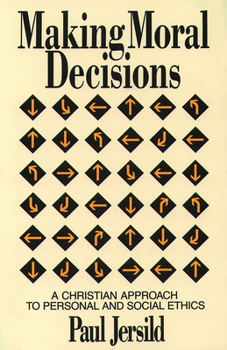Making Moral Decisions
Select Format
Select Condition 
Book Overview
The question "What am I to do?" needs the balance and completion of "What are we to do?" With clarity and insight Jersild addresses the particular need of our time: a great awareness of our interdependence as a world community. The relationship between private and public morality is clarified by exploring such questions as: "What prompts Christians to disagree on moral issues?" "Is there a Christian morality?" and "How are convictions related to decisions?" Using critical incidents or cases to illustrate ethical points, Jersild examines such contemporary issues as euthanasia, employment and one's sense of vocation, homosexuality, and more.
Format:Paperback
Language:English
ISBN:0800624718
ISBN13:9780800624712
Release Date:March 1991
Publisher:Augsburg Fortress Publishing
Length:128 Pages
Weight:0.35 lbs.
Dimensions:0.4" x 5.5" x 8.4"
Customer Reviews
1 rating
A Moral Challenge to Christians living in Community
Published by Thriftbooks.com User , 25 years ago
Jersild writes to the individual Christian who is also a member of the larger Christian community regarding the act of moral decision-making. He writes from four basic assumptions and concerns: (1) that every tradition within the household of faith needs to be instructed by and balanced by the rest of the Christian community, (2) that Christians need to see moral decision making in terms of "we" as well as "I,"(3) that the moral quality of our individual lives bears directly on the moral quality of our life together in community, and (4) that the responsibility of the Christian community is to respond to the moral challenges of our time.Jersild's primary assumption is that every tradition within the individual household of faith needs to be instructed by and balanced by the rest of the Christian community. He argues that the American concept of individualism and freedom brings a worldly and an egocentric perspective to the church community by defining freedom as "little more than being left alone (to) exercise personal moral autonomy (free) from the arbitrary authority of family, superiors at work, the church and the government." This perspective leaves Americans relating to each other in a contractual model where people "give-in-order-to-get" what they desire. Jersild's challenge is to define "freedom" according to the Scriptures and to balance it alongside of love and responsibility. The author's concern is that the warped American perspective of freedom effects more than the individual's moral decision-making; he proposes that the moral quality of our individual lives bears directly on the moral quality of our life together as a Christian community, and vice versa. The author feels very strongly that Christians need to see moral decision making in terms of "we" and not strictly in terms of "I," because the Christian community has a responsibility to say something important to the moral challenges of our time.Jersild takes a very complex subject and formulates the data into a well-rounded, and easily read book. While he makes reference to and is influenced by other works, the notations and direct references are kept to a minimum so as not to overwhelm the average reader. The author also suggests some important and well-thoughtout questions that can be used by churches in deciding which public issues warrant serious church consideration. In the last chapters of his book, Jersild also examines the recent political trend within the church. At first glance, his presentation appears to be relatively balanced without attacking any one group; however, when the discussion turns towards the Religious Right, Jersild's opinions are stated more forcefully and at more length than when he is discussing Liberalism and/or Liberation Theology. To his credit, Jersild is critical of all three views, but he appears to be especially critical of the Religious Right stating that their "insecurity and fear (will) lead to the suppr






